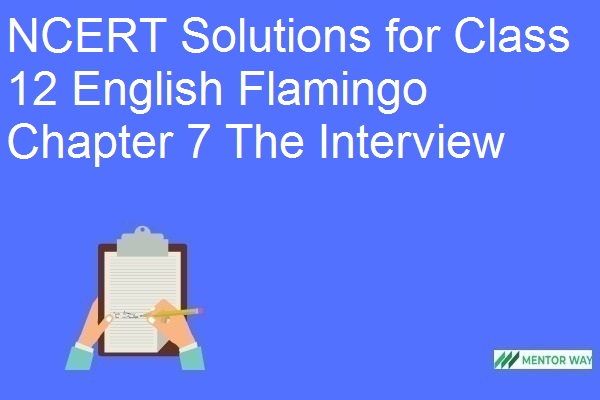NCERT Solutions for Class 12 English Flamingo Chapter 7 The Interview
17 min read
NCERT Solutions for Class 12 English Flamingo Chapter 7 The Interview
Class 12 English NCERT Solutions Flamingo Chapter 7 The Interview Free PDF Download
NCERT Solutions for Class 12 English
The Interview Textual Questions and Answers
Think-as-you-read Questions
Question 1.
What are some of the positive views on interviews?
Answer:
The positive views on interviews are that it is a medium of communication and a source of truth and information. Some even look at it as an art. These days we know about the celebrities and others through their interviews.
Question 2.
Why do most celebrity writers despise being interviewed?
Answer:
Most celebrity writers despise being interviewed because they look at interviews as an unwarranted intrusion into their lives. They feel that it diminishes them. They feel that they are wounded by interviews and lose a part of themselves. They consider interviews immoral and a crime, and an unwanted and unwelcome interruption in their personal life.
Question 3.
What is the belief in some primitive cultures about being photographed?
Answer:
Some primitive cultures consider taking a photographic portrait is like stealing the persons’s soul and diminishing him.
Question 4.
What do you understand by the expression ‘thumbprints on his windpipe’?
Answer:
Saul Bellow once described interviews as being like ‘thumbprints on his windpipe’. It means he treated interviews as a painful experience, as something that caught him by his windpipe, squeezed him and left indelible thumbprints on that. It also means that when the interviewer forces personal details from his interviewee, it becomes undesirable and cruel.
Question 5.
Who, in today’s world, is our chief source of information about personalities?
Answer:
The interviewer is the chief source of information in today’s world. Our most vivid impressions of our contemporaries are based on communication that comes from them. Thus, interviewers hold a position of power and influence.
The Interview Understanding the text
Question 1.
Do you think Umberto Eco likes being interviewed? Give reasons for your opinion.
Answer:
Umberto Eco does not think highly of interviewers who he thinks are a puzzled bunch of people. He has reasons for thinking so as they have often interpreted him as a novelist and clubbed him with Pen Clubs and writers, while he considers himself an academic scholar who attends academic conferences and writes novels on Sundays.
Question 2.
How does Eco find the time to write so much?
Answer:
Eco humorously states that there are a lot of empty spaces in his life. He calls them ‘interstices’. There are moments when one is waiting for the other. In that empty space, Eco laughingly states that he writes an article. Then he states that he is a professor who writes novels on Sundays.
Question 3.
What was distinctive about Eco’s academic writing style?
Answer:
Umberto’s writings have an ethical and philosophical element underlying them. His non-fictional writing work has a certain playful and personal quality about it. Even his writings for children deal with non-violence and peace. This style of writing makes reading his novels and essays interesting and being like the reading of most academic writings. His works are marked by an informal and narrative aspect.
Question 4.
Did Umberto Eco consider himself a novelist first or an academic scholar?
Answer:
Umberto identified himself with the academic community, a professor who attended academic conferences rather than meetings of Pen Clubs. In fact, he was quite unhappy that the people referred to him as a novelist.
Question 5.
What is the reason for the huge success of the novel, The Name of the Rose?
Answer:
The success of The Name of the Rose, though a mystery to the author himself, could possibly be because it offered a difficult reading experience to the kind of readers who do not want easy reading experiences and those who look at novels as a machine for generating interpretations. For the same reason, the sale of his novel was underestimated by his American publishers, while the readers actually enjoyed the difficult reading experience that was offered bv Umberto Eco by raising questions about truth and the order of the worid.
The Interview – Solved Question Bank
Reference-to-Context Questions
Question 1.
Today, almost everybody mho is literate will have read an interview at some point in their lives, while from the other point of view, several thousand celebrities have been interviewed over the years, some of them repeatedly.
Answer the following.
(a) Everybody who is literate has been interviewed at some point in their lives. (True/False)
(b) Several celebrities have been interviewed repeatedly. (True/False)
(c) _________ would have read an interview at some point in their lives?
(d) Several thousand _________ have been interviewed over the years, and some of them repeatedly.
Answer:
(a) False
(b) True
(c) the literate
(d) celebrities
Question 2.
H.G. Wells in an interview in 1894, referred to ‘the inteiviewing ordeal’, but was a fairly frequent interviewee and forty years later found himself intetriewing Joseph Stalin.
Answer the following.
(a) Joseph Stalin interviewed H.G. Wells. (True/False)
(b) Find a word from the extract that means ‘a person who is being interviewed’.
(c) How long after 1894, did Wells interview Joseph Stalin?
(d) Despite giving several interviews. Wells referred to the process as ‘the interviewing _________ .
Answer:
(a) False
(b) interviewee
(c) forty years
(d) ordeal
Question 3.
Yet despite the drawbacks of the interview, it is a supremely setviceable medium of communication. “These davs, more than at any other time, our most vivid impressions of our contemporaries are through interviews.”
Answer the following.
(a) These days communication is through interviews. (True/False)
(b) The most vivid impressions of contemporaries is through interviews. (True/False)
(c) Interviews are a supremely serviceable _________ of communication.
(d) Of whom can vivid impressions be collected through interviews?
Answer:
(a) False
(b) True
(c) means
(d) contemporaries
Question 4.
In 1980, he acquired the intellectual equivalent of intellectual superstardom with the publication of ‘The Name of the Rose’, which sold more than 10 million copies.
Answer the following.
(a) ‘The Name of the Rose’ is a book about a superstar. (True/False)
(h) The book, ‘The Name of the Rose’ was published in 1980. (True/False)
(c) How many copies did ‘The Name of the Rose’, sell?
(d) Eco acquired _________ with the sale of ‘The Name of the Rose’.
Answer:
(a) False
(b) True
(c) More than 10 million
(d) superstardom
Question 5.
I have some philosophical interests and I pursue them through my academic work and my novels. Even my books for children are about non-violence and peace… you see, the same bunch of ethical, philosophical interests.
Answer the following.
(a) The writer pursues his academic interests through children’s books. (True/False)
(b) Through what means does the writer pursue his philosophical interests?
(c) The writer’s books for children are about non-violence and _________
(d) The writer has some _________ interests.
Answer:
(a) False
(b) academic work
(c ) peace
(d) philosophical
Question 6.
Did you know what will happen if you eliminate the empty spaces from the universe, eliminate the empty spaces in all the atoms? The universe will become as big as my fist.
Answer the following.
(a) By eliminating empty spaces in atoms, the universe will be as big as an atom. (True/False)
(b) Besides the universe, where else does the speaker want to eliminate empty spaces.
(c) Find a word from the extract that means to ‘remove’.
(d) If the empty spaces in the universe and in atoms were measured, then the universe would be as _________ as the writer’s fist.
Answer:
(a) False
(b) atoms
(c) eliminate
(d) big
Question 7.
Your non-fictional writing, your scholarly work has a certain plavful and personal quality about it. It is a marked departure from a regular academic stvle – which is invariably depersonalized and often diy and boring.
Answer the following.
(a) The writer’s scholarly work is about play things. (True/False)
(b) The writer’s scholarly work is a marked departure from the academic style. (True/False)
(c) Which kind of writing by the author has a playful and personal quality?
(d) Scholarly writing is often dry and _________, according fo the writer of the passage.
Answer:
(a) False
(b) True
(c) academic writin
(d) boring
Question 8.
At that point, at the age of 22, I understood scholarly books should be written the way I had done – by telling the story of the research. This is why my essays always have a narrative aspect.
Answer the following.
(a) At age 22 the author understood how scholarly books should be written. (True/False)
(b) Scholarly books are written to tell the story of the research. (True/False)
(c) What special aspect do the essays written by the author have?
(d) According to the writer, he had written his research in a manner that told the _________ of his research.
Answer:
(a) True
(b) True
(c) narrative aspect
(d) story
Question 9.
I started writing novels by accident. I had nothing to do one day and so I started. Novels probably satisfied my taste for narration.
Answer the following.
(a) The author started writing novels because he was a novelist. (True/False)
(b) According to the author, novel writing probably satisfied his _________ for narration.
(c) The author started writing novels _________ .
(d) In writing, the author had a taste for _________ .
Answer:
(a) False
(b) taste
(c) accidentally
(d) narration
Question 10.
I know that by writing novels I reach a larger audience. I cannot expect to have one million readers with stuff on semiotics.
Answer the following.
(a) The author reaches a million readers by writing semiotics. (True/False)
(b) The author reaches a larger _________ by writing on semiotics.
(c) He has reached a _________ readers by writing novels.
(d) _________ is the main focus of the author’s writing.
Answer:
(a) False
(b) audience
(c) million
(d) Semiotics
Question 11.
And this is because journalists and publishers believe that people like trash and don’t like difficult reading experiences.
Answer the following.
(a) According to journalists, authors like to read trash. iTrue/Faise)
(b) According to journalists, people don’t like _________ reading experiences.
(c) According to journalists, people like _________ trash.
(d) Whose opinion about public reading habits is being aired in the passage?
Answer:
(a) False
(b) difficult
(c) reading
(d) journalists
Question 12.
I myself at 9p.m. after dinner, watch television and want to see either ‘Miami Vice’, or ‘Emergency Room ’. I enjoy it and I need it. But not all day.
Answer the following.
(a) The author states that before dinner he watches television. (iVue/Faise)
(b) The author enjoys watching ‘Miami Vice’. (True/False)
(c) The author enjoys watching ‘Miami Vice’ or ‘ Room’ on television, after dinner.
(d) What time does the author enjoy watching television?
Answer:
(a) False
(b) True
(c) Emergency
(d) after dinner
The Interview Short Questions and Answers
Question 1.
Why did Lewis Carroll have a horror of the interviewer?
Answer:
Lewis Carroll was said to have had a just horror of the interviewer. It was his horror of being lionized which made him thus repel would-be acquaintances, interviewers, and those seeking his autographs. So, he never consented to be interviewed.
Question 2.
How did Rudyard Kipling look at interviews?
Answer:
Rudyard Kipling condemned interviews. His wife writes in her diary that Rudyard Kipling told the reporters that he called being interviewed as immoral and a crime like an offence against any person. It merited punishment. It was cowardly and vile.
Question 3.
How were Rudyard Kipling and H.G. Wells critical of interviews yet they indulged in interviewing others or being themselves interviewed?
Answer:
Rudyard Kipling criticized interviews yet he interviewed Mark Twain. H.G. Wells referred to an interview in 1894 as an ordeal. Yet he was a fairly frequent interviewee. He also interviewed Joseph Stalin forty years later.
Question 4.
How are interviews, despite their drawbacks, useful?
Answer:
Despite their drawbacks, interviews are a supremely serviceable medium of communication. We get ‘ our most vivid impressions of our contemporaries through interviews. Denis Brain writes that almost everything of moment reaches us through interviews.
Question 5.
What, according to Umberto Eco, is the one thing he does through his various pieces of writing?
Answer:
According to Eco, he is always pursuing his ethical, philosophical interests which are non-violence and peace, through his academic work, his novels and even his books for children. He uses his spare moments constructively.
Question 6.
Umberto Eco tells Mukund that he has a secret. What is that?
Answer:
Umberto Eco tells Mukund that he has a secret to reveal. He tells him that there are empty spaces in the universe, in all the atoms. If they are removed, the universe will shrink to the size of a fist. He calls these empty spaces interstices and he writes in these interstices.
Question 7.
How, according to one of Eco’s professors in Italy, do scholars do in their research? How is Eco’s approach different?
Answer:
According to one of Eco’s professors in Italy, scholars made a lot of false hypotheses. They correct them and at the end they put the conclusion. But Eco told the story of his research and included his trials and errors. His professor allowed the publication of Eco’s dissertation as a book.
Question 8.
What did Umberto Eco learn at the age of 22 that he pursued in his novels?
Answer:
At the age of 22, Umberto Eco understood that scholarly books should be written the way he had done, that is, they should be written by telling the story of the research. He means to say that they should have the narrative technique. That’s why he started writing novels so late—at the age of 50.
Question 9.
How did Eco start writing novels?
Answer:
Eco states that he started writing novels by accident. One day, he had nothing to do, so he started writing. He felt that novels probably satisfied his taste for narration and he produced five novels, including the famous The Name of the Rose.
Question 10.
Did Umberto Eco consider himself a novelist first or an academic scholar? Discuss briefly.
Answer:
Umberto Eco considered himself an academic scholar, a university professor who wrote novels on Sundays. If somebody said that he was a novelist, that bothered him. He participated in academic conferences and not the meetings of Pen Clubs and writers. He identified himself with academic community.
Question 11.
What makes Eco’s The Name of the Rose a very serious novel?
Answer:
The Name of the Rose is a very serious novel. It is a detective story at one level but it also delves into metaphysics, theology and medieval history. Due to these reasons it was greatly received by the public.
Question 12.
What, according to Eco, puzzles journalists and publishers?
Answer:
According to Umberto Eco, journalists and publishers are puzzled when something unexpected happens. They believe that people like trash and do not like difficult reading experiences. But Eco’s novel The Name of the Rose, a serious work, sold between 10 and 15 million copies. This puzzled them.
Question 13.
What is the reason for the huge success of the novel, The Name of the Rose?
Answer:
The reason for the huge success of the novel, according to Eco, is a mystery. Nobody can predict it. He states that if he had written the novel ten years earlier or ten years later, it wouldn’t have been the same. So, the time component, its narrative technique, its aspects of metaphysics, theology and medieval history, made it a grand success.
Question 14.
Do you think Umberto Eco likes being interviewed? Give reasons for your opinion.
Answer:
I think Eco likes being interviewed. His answers to Mukund’s questions are straightforward, precise and to the point. They are never wavering. He even mentions his preferences about TV shows. While answering he gets humorous and laughs. Nowhere does he say anything that may give us this sort of glimpse that he does not like being interviewed.
Question 15.
Is Umberto’s informal style consciously adopted or natural?
Answer:
Umberto’s doctoral thesis was a story of his research and a sum of his experience, his trials and errors. The thesis was appreciated and published as a book. Umberto then developed on his taste for narration and this narrative aspect lends an informal touch to all his essays and novels. It makes his style alive and reading his works is not dry and boring like the reading of other academic works.
Question 16.
Why did Umberto take to writing novels?
Answer:
Umberto took to writing novels to satisfy his taste for narration. He did not have even a single novel to his credit, till the age of 50. One day having nothing to do, he started writing a novel. Moreover, he thought that novels have more readership and he could reach a larger audience.
Question 17.
What made Roiand Barthes frustrated? What did he want to do?
Answer:
Eco s friend Roland Barthes was an essayist. He was not satisfied fully with his scholarly essays. He yearned to do some creative writing. He remained frustrated that he was as essayist and not novelist. But, unfortunately he died before he could do so.
Question 18.
How did Umberto Eco become spectacularly famous?
Answer:
Umberto Eco had earned a good reputation in the field of semiotics or the study of signs. His scholarly works were staggeringly large and wide ranging. But his spectacular fame came to him with his novel The Name of the Rose which stormed the world and sold more than 10 million copies.
Question 19.
What sort of TV programmes does Eco watch after dinner and why?
Answer:
After dinner, Eco watches light television programmes like Miami Vice and Emergency Room. These programmes do not tax his mind and he feels relaxed after a hard, day’s work. But he cannot watch such programmes the whole day.
Question 20.
Bring out Umberto Eco’s humility and modesty as evident in the chapter.
Answer:
Umberto Eco takes success in his stride and talks about his achievements in all modesty. He very humbly gives credit to the people’s capability of appreciating difficult reading experiences. Regarding doing so many things, he tells that it a fallicious impression, but at the end of the day, he is doing the same thing.
The Interview Long Questions and Answers
Question 1.
The Interview as a communication genre is here to stay. Discuss with reference to the interview with Umberto Eco.
Answer:
The interview today is a communication genre that has come to stay. Its detractors—mostly celebrities— despise it as an intrusion into their lives. However, a good interview can be a source of truth, it is an excellent medium of communication and in the modern world our most vivid impressions of contemporaries are through interviews. It is through the interview that we learn about Eco’s diverse writings, his interest in the philosophy of non-violence and peace and his ability to put every spare moment to constructive use. At the interviewer’s prompting, he tells us why he writes scholarly works in an informal style and how he started writing novels. We realise that he is an academician at heart. He honestly talks of the success of his book as a mystery saying that it might •not have sold so well in another time.
Question 2.
How did Umberto Eco assess his style of writing in The Name of the Rose?
Answer:
Umberto Eco considered himself to be an academician who was happy writing novels on Sundays. Though he did not feel he was a novelist, he felt the novel fulfilled his desire for narration. In fact, he spoke of himself as a university professor who wrote novels on Sundays. The novel, according to him, enabled him to reach a larger audience. The Name of the Rose was a very serious novel. It was a detective story that delved into metaphysics, theology and medieval history’. It enjoyed a huge audience as, according to him, people did enjoy difficult reading experiences. Like him. many did not like easy experiences all the time. The novel deals with a period of medieval history and the publisher did not expect to sell so well in a state where nobody had studied Latin or seen a cathedral. He felt the timing was crucial. Perhaps its popularity would have been less, had it been written earlier or later. ‘
Question 3.
How do celebrity writers despise being interviewed as given in ‘The Interview’?
Answer:
Since its invention a little over 130 years ago, the interview has become commonplace journalism. Over the years, opinions about its functions, methods and merits vary considerably. Some say it is a source of truth and in practice, an art. Others despise it being an unwarranted intrusion into their lives. They feel it diminishes them. They equate it to taking a photographic portrait of somebody which in some primitive cultures mean ‘stealing the person’s soul.’ Some people feel wounded by interviews and lose part of themselves. They call it immoral, a crime and an assault. To some it is cowardly and vile or an ordeal.
Question 4.
How does Eco explain that he is convinced he is always doing the same thing?
Answer:
Umberto Eco explains to Mukund Padmanabhan in an interview that all the people have a lot of empty spaces. These he call ‘interstices’. He explains them through an example. He says that one is to come to him and is in an elevator and he is waiting for him. While waiting for the guest’s elevator to appear before him. he has already written an article. It means he writes in snatches of time. However, his creative ideas flow in his mind every time even when he is hosting his guest. Though he relaxes on Sundays, yet is very much busy to write novels. On other days he is busy with his academic work.
Question 5.
How does Mukund Padmanabhan comment on Eco’s academic writing style? What does Eco say about it?
Answer:
Mukund Padmanabhan states that Eco’s non-fictional writing, that is, his scholarly work has a certain playful and personal quality about it. It is a marked departure from a regular style. That regular style is invariably depersonalised and often dry and boring. To a question if he consciously adopted
an informal style, he cited the comments of one of the professors who examined and evaluated his first doctoral dissertation. The professor said that scholars learned a lot of a certain subject, then they made a lot of false hypotheses, then they corrected and put conclusions at the end. But Eco told the story of his research, including his trials and errors. At the age of 22, Eco understood that scholarly books should be written by telling the story of the research. His essays, therefore, have a narrative aspect. That is why, he wrote novels to satisfy his taste for narrative.
Question 6.
How does Mukund Padmanabhan impress you as an interviewer? Do you consider his interview with Umberto Eco a success?
Answer:
Mukund Padmanabhan’s interview with Umberto Eco tells about his capabilities as a successful interviewer. He does not encroach upon his privacy or embarrass him with personal questions. He does not come in-between the celebrity and the readers. His questions are well worded. His questions • draw out of him what his fans would like to know. The questions asked by Mukund cover all the aspects of his works and personality. Eco gives elaborated answers to all his questions. With every question, the interviewer withdraws to the background leaving the interviewee in the limelight. The whole interview does not appear to be an ordeal for the interviewee. In short it is crisp at the same time informal.
Question 7.
What are the opinions of some of the celebrities on interviews?
Answer:
Celebrities have often seen themselves as victims of interviews. In V.S. Naipaul’s opinion, interviews have left people wounded and part of them stolen. Lewis Carroll was in horror of the interviewer and he never consented to be interviewed. He often silenced all those who sought to interview him or ask for his autographs. Rudyard Kipling too held a very critical attitude towards interviews and disapproved of them after he was left almost wrecked by two reporters from Boston. According to his wife, since then he found interviews were vile, immoral and a crime. To H.G. Wells, being interviewed was an ordeal, while to Saul Bellow, interviews were like thumbprints on his windpipe, an extortion of personal details by an overbearing interviewer. They all seemed to be terrified of interviews.
Question 8.
How does the interview with Umberto Eco prove that the interview is the most commendable tool to elicit information about the interviewee?
Answer:
Mukund Padmanabhan from ‘The Hindu’ interviews Umberto Eco and proves that interview is the most commendable tool to elicit information about the interviewee.
Through his interview he reveals that Eco is a prolific writer and yet a man who is most modest about his achievements. He very humbly spells the secret of his varied and staggeringly voluminous works produced by him. When Mukund asks him about David Lodge’s remark that how one man can do all the things that Eco does’, Eco very modestly says it is a fallacious impression, in fact he has always been doing the same thing by pursuing the same philosophical ideas. He views himself as an academic, rather than a novelist. He admits that he has started writing novels by accident and writes novels on Sundays.



